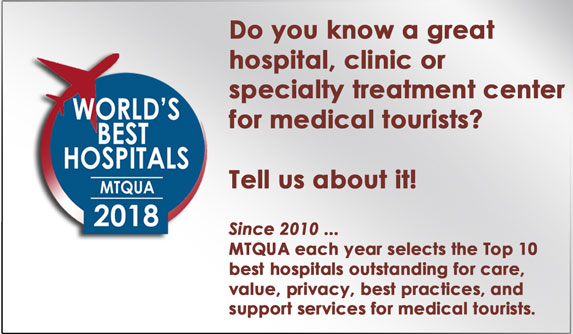 Web-based medical tourism information suffers from poor quality of information, inconsistency in the kinds of information offered, lack of ethical concerns, absence of safety, quality and confidentiality controls, omission of important facts, and questions of accuracy and honesty.
Web-based medical tourism information suffers from poor quality of information, inconsistency in the kinds of information offered, lack of ethical concerns, absence of safety, quality and confidentiality controls, omission of important facts, and questions of accuracy and honesty.
These are the conclusions of Suchitra Wagle, a research scholar at the Indian Institute of Technology Bombay, who analyzed the websites of more than 200 medical tourism facilitators, agents and brokers and published the results recently in an Indian Journal of Medical Ethics report. She points out that while the quality of all online information varies widely, it is even more so with medical tourism websites.[Tweet “Medical tourism info on the net low on ethics, safety, privacy, truth “]
Hospital and medical tourism company websites are an essential component of the medical tourism industry.
- These websites have emerged as the most common sources of information that influence a patient’s choice of destination country and providers of treatment and services.
- These websites connect hospitals and physicians to patients across the world.
- They are networking tools that provide particular hospitals or physicians with a much wider platform and can promote them across the globe.
Are they good enough for patients to make informed decisions?
Today, the range of information on these websites is huge, from very good information to that which is not very relevant. Rather than conveying useful information the material on both hospital and medical travel services websites is more of a marketing message and lacks information to substantiate the claims they make.
In the article The Ethics of Medical Tourism Company Websites Katherine Wertz and Magdalena Berry write that
Medical tourism companies may feel the urge to draw in as many customers as possible, sometimes blurring the line between patient safety and profit… They downplay (risk) significantly in favor of highlighting the positive aspects of their business in order to attract and maintain clients… (This) impairs patients’ ability to make informed health decision, therefore calling into question the ethics of the websites and the companies themselves.[Tweet “Medical tourism companies sometimes blur the line between patient safety and profit”]
Poor information on medical tourism websites creates false trust.
In medical tourism, the internet allows unqualified personnel easy entry into the health services trade. An absence of conventional doctor-patient relationships creates quasi-professional relationships between prospective patients and intermediaries such as medical travel agents, facilitators, or other non-medical personnel.
The natural inclination of consumers in this quasi-professional relationship is to trust the intermediaries and their information.
Control quality of information through certification.
Whereas doctors are governed by a code of conduct, intermediaries working in medical tourism, from hospital international patient coordinators to facilitators and brokers are not subject to any ethical or practical constraints.[Tweet “Medical tourism hospital international coordinators, facilitators, brokers not subject to ethical constraints”]
One control over quality of information and confidentiality of private data is provided by medical tourism certification from the Medical Travel Quality Alliance. Intermediaries and providers that become medical tourism certified by MTQUA are required to put into operation a code of conduct and other safety, confidentiality and privacy protections for medical tourists.
The certification also requires they take steps to raise the quality of their websites with regard to the information they present and the methods by which they manage private data.
Apply for Medical Tourism Certification.

 >
>
2 Responses to Medical Tourism Websites Lack Ethics, Safety, Privacy, Truth.